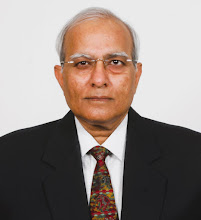THE PURPOSE-DRIVEN LIFE OF A FACULTY: MY JOURNEY TOWARD ETHICAL TEACHING AND STUDENT EMPOWERMENT
In a time when education is often reduced to metrics and modules, I
believe that living a purpose-driven academic life is more important than ever.
For me, being a faculty member is not just about delivering lectures—it's about
shaping character, nurturing curiosity, and guiding students toward meaningful
futures.
Teaching as Dharma, Not Just a Job
Over the years, I’ve come to see a clear distinction between two kinds
of educators: the Teaching Professional (Guru) and the Teaching
Employee. I strive to be the former. To me, teaching is a dharma, a sacred
duty. It’s not just about fulfilling hours or covering syllabi. It’s about
mentoring with empathy, engaging with curiosity, and uplifting students beyond
the classroom.
I’ve seen how a purely transactional approach to teaching can quietly
erode the integrity of our institutions. It’s like termites in a wooden frame, unseen
but deeply damaging.
Seeing Students as My Own
I’ve always tried to see my students as I would my own children. This
shift in perspective has transformed the way I teach. It fosters patience,
empathy, and a deeper sense of responsibility. When I teach with the heart of a
parent, I’m not just delivering content, I’m shaping lives.
Cultivating Curiosity: The Habit of “How & Why”
I encourage my students to ask questions—not just “What is this?” but
“How does it work?” and “Why does it matter?” I believe that true education
begins when students stop memorizing and start questioning. My classroom is a
space where intellectual courage is celebrated more than correct answers.
Career Stewardship: Beyond Placement
Helping students find meaningful employment is a responsibility I take
seriously. I guide them not just toward jobs, but toward careers that align
with their values and strengths. For students from underrepresented
backgrounds, mentorship becomes a vehicle for dignity and mobility.
Character Building Through Visionary Messaging
I often share messages that I hope will stay with my students long after
they graduate:
- Be the
leader, not the follower
- Innovate
or perish
- If
others can achieve, why can’t we?
These aren’t just slogans, they’re principles I try to embed in every
interaction.
Commitment to Society, Nation, and Humanity
I remind my students that their education isn’t just for personal gain, it’s
a commitment to society. I link classroom content to real-world challenges and
encourage community engagement. Technical excellence must serve the public
good.
Adopting the “Giving Back” Mode
I believe in the ethic of gratitude and contribution. I encourage alumni
to mentor juniors and celebrate student-led initiatives that serve local
communities. Acts of service should be woven into the fabric of academic
excellence.
Faculty as Flag Bearers of Ethics and Morality
I hold myself to the same standards I expect from my students. Upholding
originality, fairness, and truth in academic practices is non-negotiable. I
challenge traditions that conflict with integrity and speak truth to power, with
humility and courage.
“A faculty member is not just a teacher, we are torchbearers of truth,
sculptors of character, and stewards of possibility.”
Curriculum as Character Formation
Every subject I teach, whether welding metallurgy or cyber-physical
design, is an opportunity to reflect on ethics, history, and societal impact. I
tailor content to indigenous needs, resist the glamour of foreign textbooks,
and celebrate Indian contributions to science and engineering.
“Curriculum must not mesmerize—it must awaken. It must not copy—it must
create. It must not just inform, it must transform.”
Emotional Literacy and Mental Well-being
I recognize that students are not just minds to be trained, they are
hearts to be understood. I try to create safe spaces for emotional growth and
teach resilience in the face of failure.
Community Engagement and Public Advocacy
I encourage my students to apply their learning to real-world challenges
and participate in national conversations on ethical engineering and
sustainability. Education must ripple outward, into villages, industries, and
public discourse.
Legacy Through Documentation and Sharing
I believe that our impact multiplies when we share our insights. I
publish reflections, create open-access resources, and strive to leave behind
not just data, but wisdom.
Final Reflection
To live a purpose-driven life as a faculty member is to be a bridge:
Between knowledge and wisdom, Between students and society, Between today’s
classroom and tomorrow’s conscience.
It means teaching with empathy, leading with integrity, and mentoring
with vision. As I often remind myself:
“The nobility of teaching lies not in the syllabus we cover, but in the
souls we uncover.”











